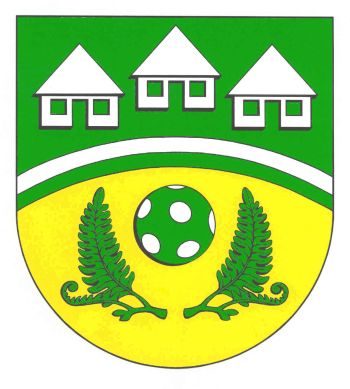Nindorf (Dithmarschen): Difference between revisions
Knorrepoes (talk | contribs) m (Text replacement - "{{de1}}↵{{media1}}↵↵'''Literature''': Kommunale Wappenrolle Schleswig-Holstein" to "'''Literature''': Kommunale Wappenrolle Schleswig-Holstein {{de1}} {{media1}} ") |
Knorrepoes (talk | contribs) m (Text replacement - "|'''English''' ↵| {{blazon wanted}}↵" to "|'''English''' | blazon wanted ") |
||
| Line 17: | Line 17: | ||
|- | |- | ||
|'''English''' | |'''English''' | ||
| | | blazon wanted | ||
|} | |} | ||
Revision as of 11:21, 7 April 2023
NINDORF
State : Schleswig-Holstein
District (Kreis) : Dithmarschen (until 1970 Süderdithmarschen)
Additions : 1974 Farnewinkel
Amt : Amt Mitteldithmarschen (until 2008 Amt Kirchspielslandgemeinde Meldorf-Land)
| German | Von Grün und Gold in Bogenteilung zum Schildhaupt mittig geteilt, oben über einen schmalen silbernen Bogenbalken drei silberne Haussilhouetten nebeneinander, unten eine grüne Boßelkugel mit silbernen Punkten zwischen zwei grünen Farnwedel. |
| English | blazon wanted |
Origin/meaning
The arms were officially granted on June 26, 2002.
The municipality is situated on the border of the sandy Geest area and the marshy Dithmarscher Marsch. This is symbolised by the division line and colours. The three houses in the chief symbolise the new village (which is the meaning of the name). The lower half symbolises the village Farndorf in the municipality and shows two canting fern leaves. The silver and green bends symbolise the historical important Ochsenweg road. The golden part also symbolises the Engelsberg hill, a natural monument. The ball in the centre of the shield is a Bosselkugel. Bosseln is a traditional North-German and Dutch sport, also known as Klootschiessen or klootschieten in which balls are thrown and the purpose is to reach a certain distance in as few throws as possible.
Literature: Kommunale Wappenrolle Schleswig-Holstein
